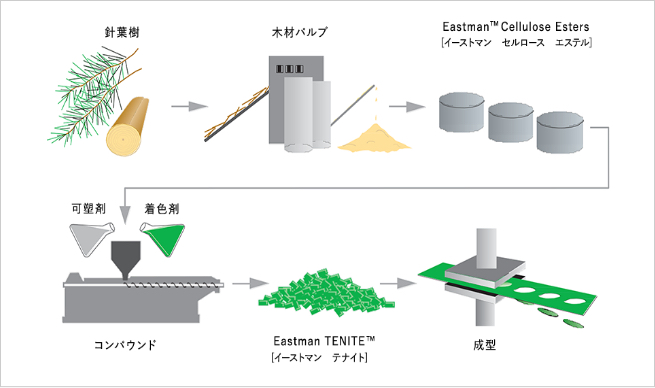Basic Approach
The NAGASE Group possesses trading, manufacturing, and R&D functions, enabling us to operate globally and across diverse industries while handling an exceptionally broad range of products. We recognize that our business activities including the manufacturing and sale of these products are deeply connected to natural capital across the entire value chain, from raw material procurement onward. We also acknowledge that our operations, particularly in manufacturing and distribution, have an impact on nature and ecosystems.
Biodiversity both influences and is influenced by environmental challenges such as climate change and resource circulation. Because it directly affects corporate sustainability, the conservation and sustainable management of natural capital and biodiversity are essential to the continued success of our business.
We are committed to considering the sustainability of natural capital in our raw material sourcing. Throughout every stage of the value chain including emissions during manufacturing and processing, waste management, and the full product lifecycle we strive to understand our relationship with natural capital. We aim to minimize our environmental footprint, including impacts on ecosystems, and to make responsible, sustainable use of natural capital.
Business Activity Policy
New Business
In order to achieve a balance between natural capital, biodiversity and business activities, we conduct surveys and assessments of the impact of new businesses on the overall environment, including the conservation of forests and biodiversity, and of the effective use of resources, energy, and water resources, and strive to conserve the environment and reduce our impact.
Existing Business
As part of the environmental management system of the Group's ISO 14001 management organization, we assess the impact of our existing businesses on natural capital and biodiversity throughout the value chain, formulate action plans, and manage progress.
Basic Approach to Sustainable Palm Oil Procurement
Palm oil has been linked to environmental destruction caused by plantation development in tropical regions and human rights abuses of plantation workers, etc. The NAGASE Group believes that it is important to eliminate deforestation, maintain and restore ecosystems, and protect workers' rights when procuring palm oil, and we will procure palm oil in a sustainable manner. The NAGASE Group is committed to sustainable palm oil procurement.
As part of its efforts, NAGASE & CO., LTD. joined the RSPO "Roundtable for Sustainable Palm Oil" in August 2017, which aims to procure sustainable palm oil with consideration for environmental impacts, and continuously participates in RSPO meetings and briefings to promote sustainability throughout the supply chain. We are promoting the spread of sustainability throughout our supply chain.
We have also set a goal to procure 100% sustainable palm oil by the end of FY2025.

TNFD-Aligned Disclosure
The Taskforce on Nature-related Financial Disclosures (TNFD) is an international framework established to help companies better understand and disclose their dependencies and impacts on natural capital, as well as to manage nature-related risks and opportunities appropriately. Following the precedent set by the Task Force on Climate-related Financial Disclosures (TCFD), there is increasing demand for greater transparency and enhanced corporate sustainability in relation to nature.
In response to these global developments, we joined the TNFD Forum in August 2022 and have since been working to build internal structures and gather relevant information. Guided by TNFD principles, we aim to clarify how our business depends on and impacts natural capital, and to systematically identify and disclose nature-related risks and opportunities.
As part of this initiative, we identified priority business areas and conducted analyses in alignment with TNFD's recommended disclosures and the LEAP approach※. Specifically, we focused on the chemical and food-related businesses within the NAGASE Group, which are considered to have particularly strong links to natural capital. The analysis covered upstream activities (such as raw material procurement and manufacturing) as well as direct operations (including manufacturing and distribution). Both domestic and international manufacturing sites were included, with a clearly defined geographic scope for assessment.
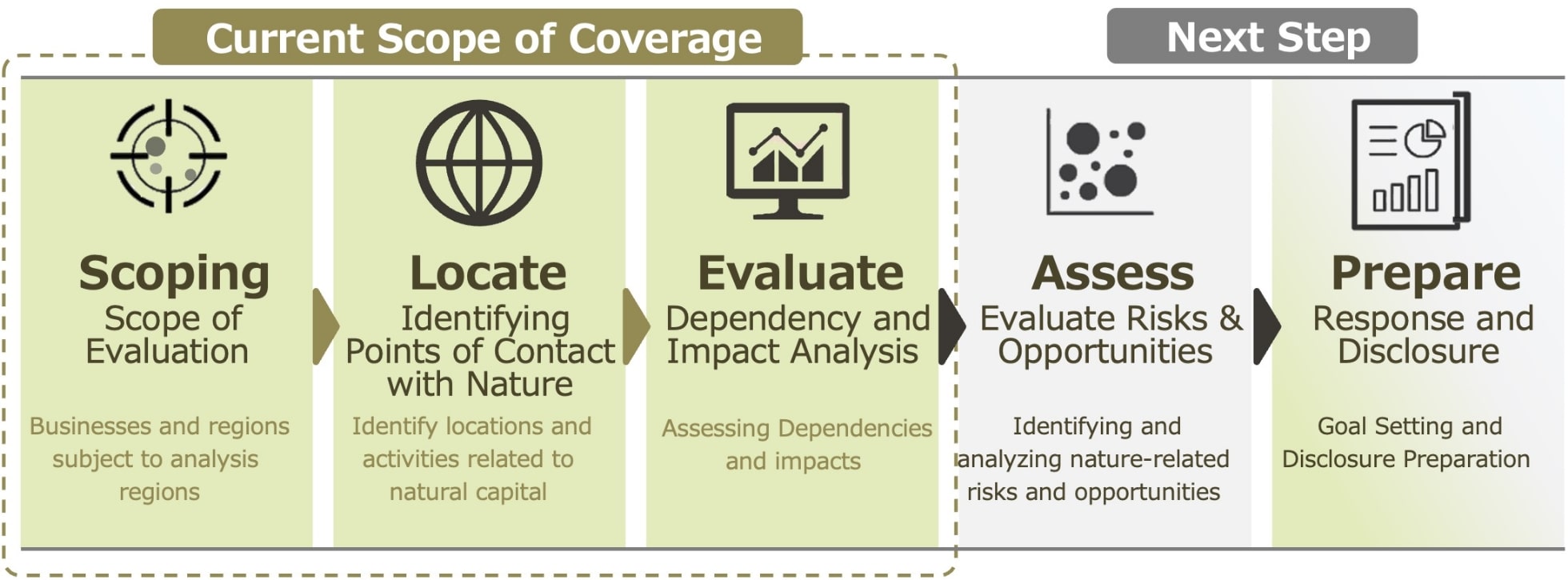
- ※ LEAP: An evaluation and analysis step developed by TNFD, providing an integrated approach for assessing nature-related issues, including points of contact with nature, dependencies on nature, impacts, risks, and opportunities.
Nature-related Governance and Risk/Impact Management
■ Board of Directors Monitoring System
To promote sustainability management, we have established the Sustainability Committee chaired by the President and Representative Director. This committee is responsible for driving initiatives across the organization, including the periodic revision of materiality (key issues) and the monitoring of related measures. The committee reports its activities to the Board of Directors at least once a year and receives appropriate oversight and resolutions as needed.
Environmental topics including natural capital are among the key themes discussed by the committee and are subject to continuous review.For more information on our governance structure, please see:“NAGASE Group Sustainability – Promotion Framework”
■ Risk and Impact Management
Nature-related risks and opportunities, including those involving natural capital, are managed by the Sustainability Committee. The committee reports at least once a year to the Board of Directors and other governing bodies for review and action.
Company-wide risks, including sustainability-related ones, are also handled by the Risk Management & Compliance Committee, which reports to the Board of Directors and the Board of Auditors. These processes ensure that environmental risks, including those tied to natural capital, are regularly assessed under Board oversight.
Since natural capital risks are closely linked to climate risks, we currently address them as part of our climate risk assessments. However, we are now conducting evaluations to better understand our specific dependencies and impacts on natural capital.
Based on the results of these assessments and the degree of impact natural capital has on our business, we will advance to the next stage: refining our assessments, identifying specific risks and opportunities, and formulating appropriate response strategies.
Strategy
■ Process for Identifying Nature-Related Dependencies, Impacts, Risks, and Opportunities
The NAGASE Group is conducting assessments to better understand how our business activities depend on and impact natural capital, with the aim of building a sustainable relationship with nature. Through these efforts, we seek to clarify our connection to ecosystem services and lay the groundwork for business strategies that promote coexistence with the natural environment.
NAGASE Group's Business and Nature Relationship (Example)
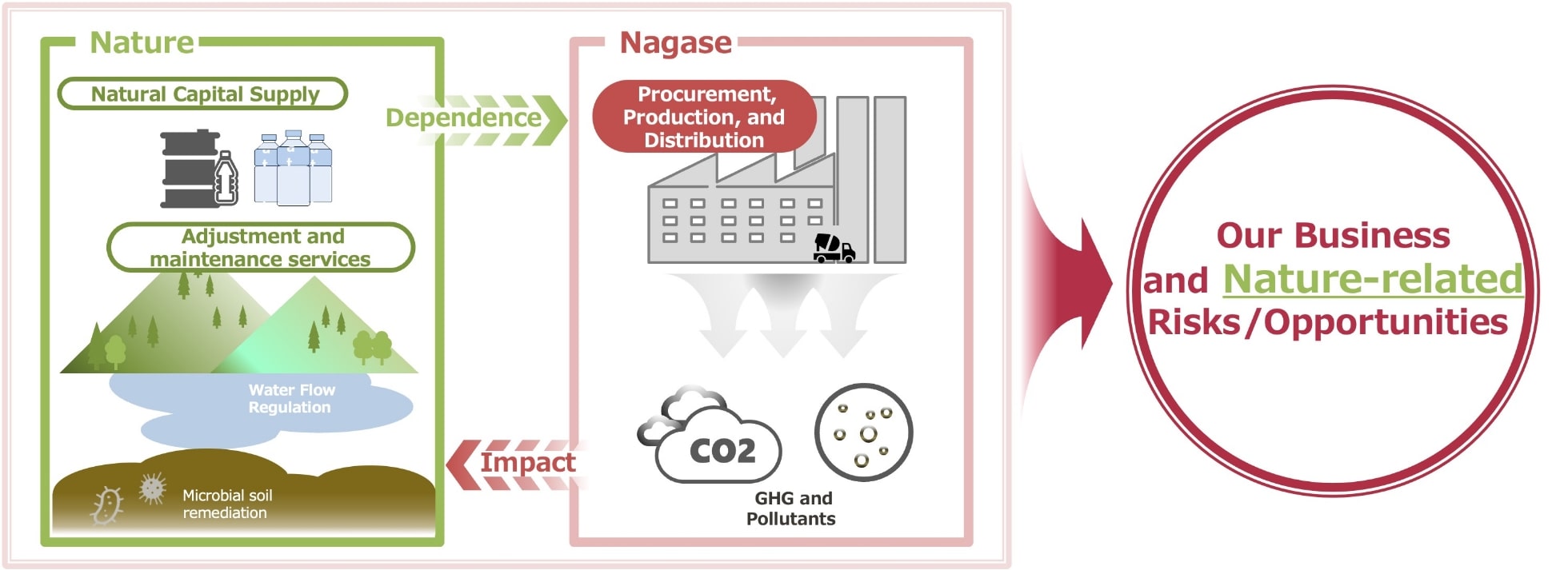
The NAGASE Group operates globally and across diverse sectors, with trading, manufacturing, and R&D functions. In our recent assessment of natural capital, we focused on businesses with particularly strong connections to nature, specifically our chemical and food-related business. The analysis covered the entire value chain, including our trading, manufacturing, and R&D functions, with a focus on identifying key dependencies and impacts on nature.
We used ENCORE, an internationally recognized tool, to assess how our business activities depend on and affect ecosystem services. The results revealed that upstream activities, such as crop cultivation and processing have very high dependencies on provisioning services (e.g., water and genetic resources) and regulating services (e.g., climate and water flow regulation).
Across the broader supply chain, including our direct operations, the manufacturing of chemicals, pharmaceuticals, and food showed high reliance on ecosystem services like stable water supply and flood risk mitigation factors directly tied to business continuity.
In contrast, our trading operations, which also fall under direct operations, showed limited dependency on biodiversity, with only moderate reliance identified in certain areas.
As for impacts, the assessment found that upstream value chain activities tend to exert relatively stronger pressure on ecosystems. These impacts include land, freshwater, and marine use changes; overuse of water resources; pollution of soil and water; and disruption of ecosystems posing significant threats to biodiversity.
Similar impacts were observed in chemical manufacturing and R&D, where the use of large volumes of water, chemical emissions, and inadequate waste management were identified as potential sources of ecosystem degradation.
Meanwhile, the impact of our trading activities on biodiversity was relatively limited, with most items assessed as “low” or “not applicable.”
Dependencies on Nature
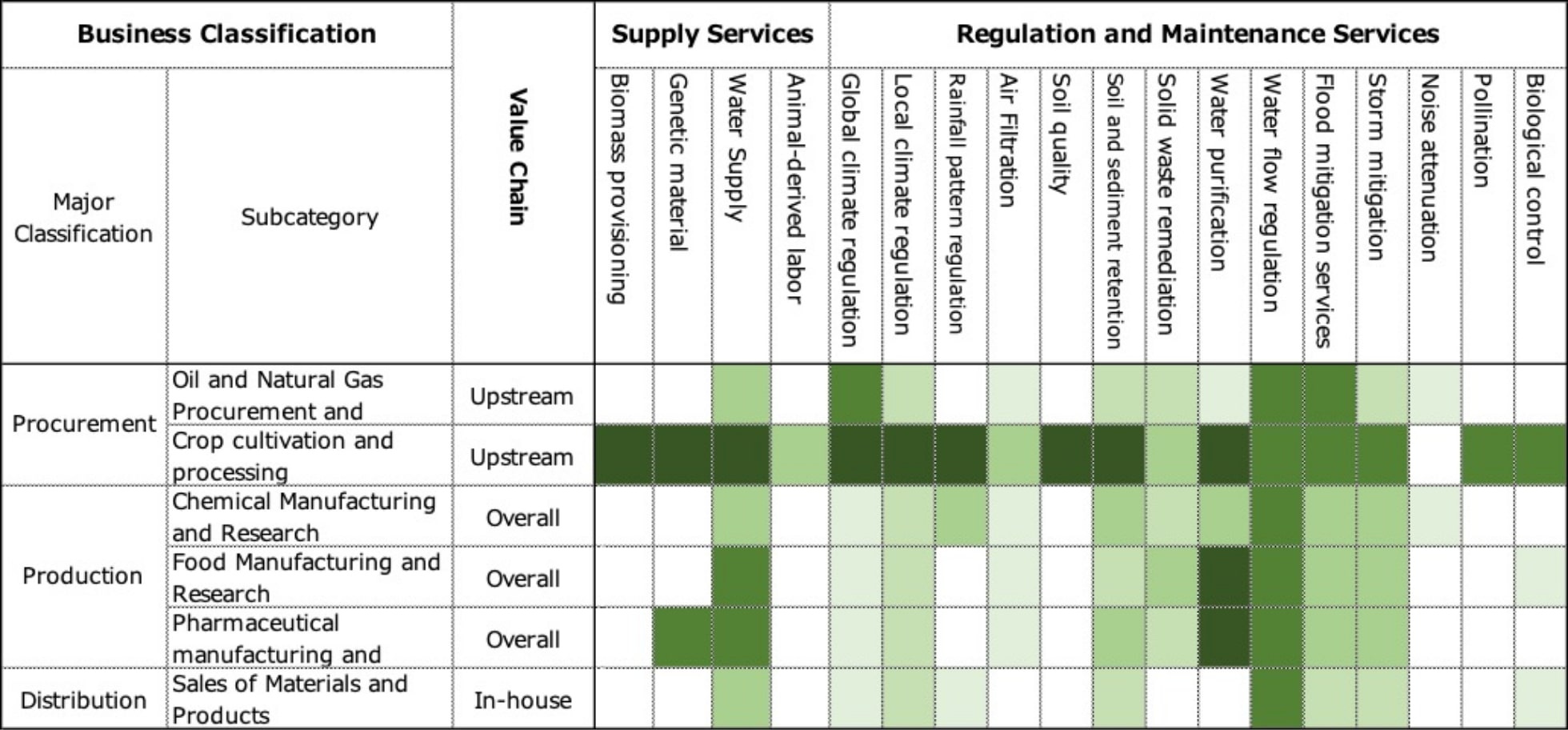
Impacts on Nature
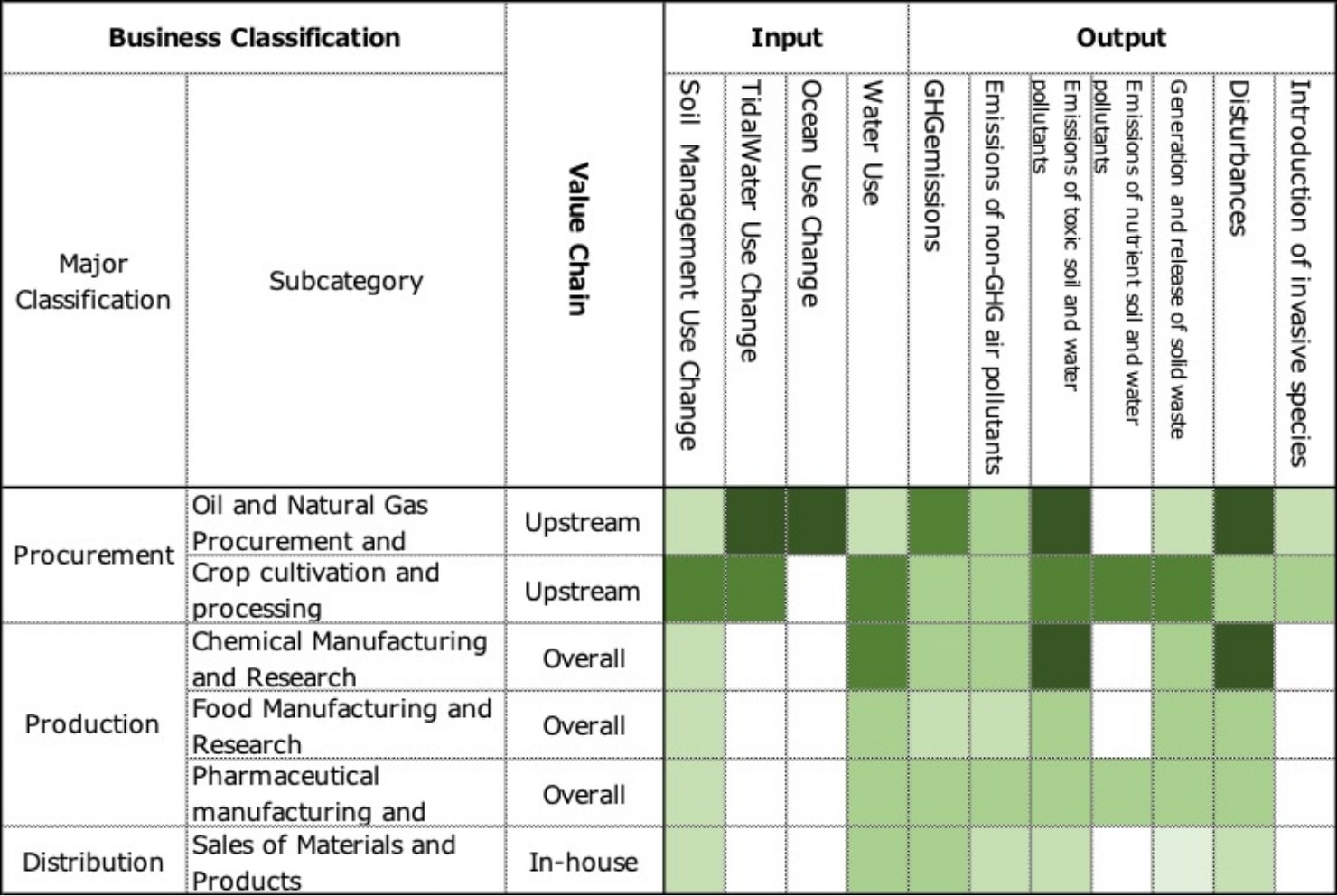
- ※ Value Chain
Refers to the value chain related to our business.
・ "Overall" implies relevance across all stages of the value chain, including "upstream," "downstream," and "in-house."
・ "Upstream" primarily refers to the raw material procurement and processing stages. - ※ Importance

Overall, it has become clear that our value chain especially its upstream activities has a strong connection to natural capital.
However, a high level of dependence on or impact on natural capital does not necessarily equate to a direct risk or opportunity. Recognizing these relationships accurately and taking responsible action in cooperation with the entire value chain is essential to avoid contributing to negative impacts on natural capital. In light of this, we will continue to evaluate and implement appropriate actions going forward.
■ Identifying Priority Locations Related to Natural Capital
In line with the TNFD’s definition of “Priority Locations,” we have identified and analyzed areas where our relationship with natural capital is particularly significant. The analysis focused primarily on manufacturing operations, where dependence on and impacts on the natural environment through raw material use and the disposal of pollutants are relatively high and particularly relevant within our value chain. Approximately 40 domestic and international manufacturing sites, including our headquarters, were included in the assessment.
The TNFD defines “Priority Locations” from two perspectives: (1) areas of concern for ecosystems, and (2) areas of high business importance to the company. In this assessment, we first focused on the former areas of concern for ecosystems.
The analysis was conducted using the four TNFD-recommended criteria:①Importance of biodiversity ②Physical water risk ③Ecosystem integrity ④Importance of ecosystem service provision
We used available tools corresponding to each of these criteria, conducting the analysis within a feasible scope.
| Criteria | Content | Utilization Tools |
|---|---|---|
| Importance of Biodiversity | ・Areas designated as protected areas ・Protected areas designated by the IUCN ・Key Biodiversity Areas | Integrated Biodiversity Assessment Tool (IBAT) |
| Physical water risk | ・Areas of high physical water risks | WRI Aqueduct Water Risk Atlas and Tools (Aqueduct) |
| Ecosystem integrity | ・Areas of high ecosystem integrity ・Areas of rapid decline in ecosystem integrity | Biodiversity Risk Filter (BRF) |
| Importance of ecosystem service provision | ・Areas important to Indigenous peoples and local communities |
We identified "Ecosystem-sensitive areas" by analyzing the surrounding environments of our manufacturing sites using the following tools:
IBAT Analysis
Using the Integrated Biodiversity Assessment Tool (IBAT), we assessed the presence of endangered species and the distribution of protected areas near each site. As a trial, we conducted surveys within a 50 km radius from each location. The results showed a higher number of endangered species in the Kansai region of Japan, where many of our manufacturing sites are concentrated. We also found that certain sites in Europe and the Yokohama area of Japan are located adjacent to protected areas. (See Figure 1 for proximity to Key Biodiversity Areas.)
Aqueduct Analysis
Through the Aqueduct tool, we evaluated the water stress levels at each site. No sites in Japan were found to be in high water stress areas; however, two overseas sites were identified as being located in such areas (see Figure 2).
Analysis using the Biodiversity Risk Filter
This tool revealed that some sites are located in areas experiencing decreasing tree cover. It also highlighted relatively high risks related to nutrient and pesticide runoff, as well as air pollution.
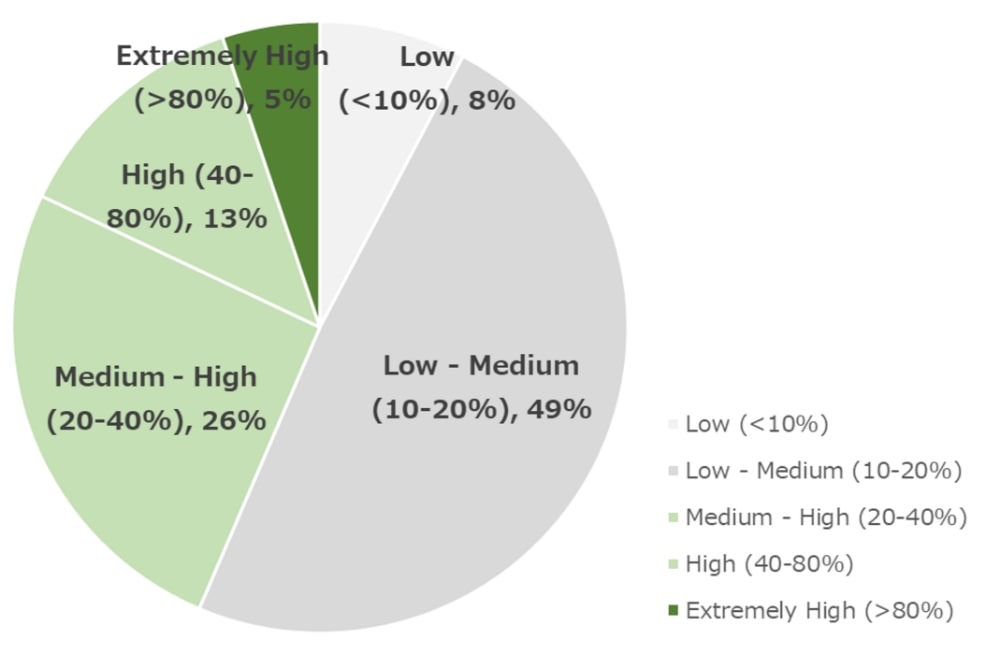
(Figure 1)
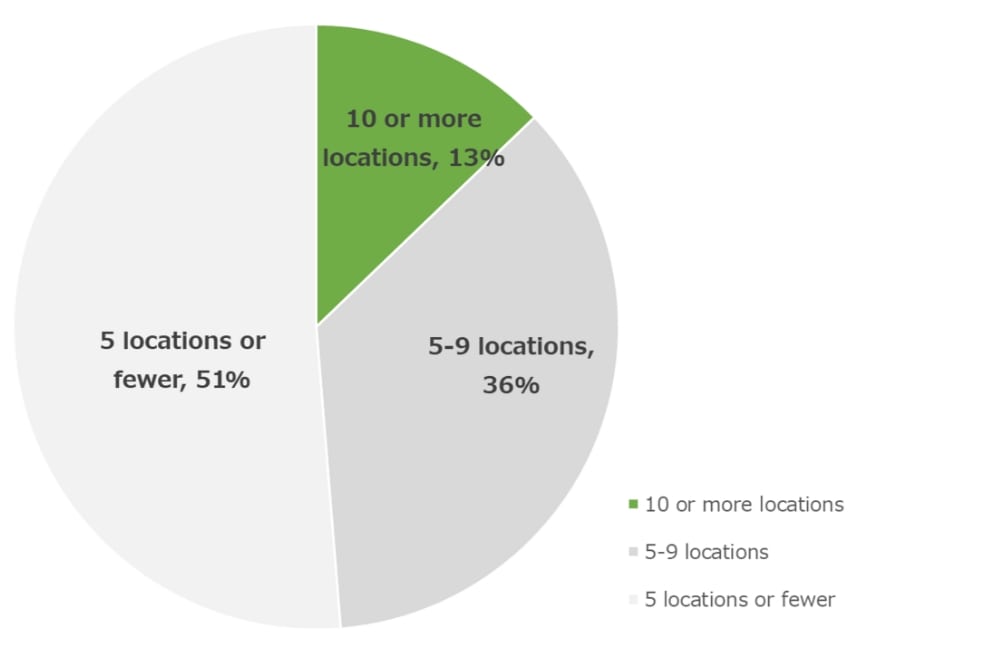
(Figure 2)
Our company has long emphasized environmental stewardship, striving to operate in compliance with relevant environmental laws and regulations in each country.
Based on the findings from these tools, we plan to conduct on-site investigations to gain a more accurate understanding of local conditions and inform appropriate responses.
Please note that this assessment is based on currently available data and tools. We intend to use the findings as a foundation for enhancing strategic decision-making and strengthening engagement with local communities, while verifying consistency with actual site conditions.
Indicators and Targets
Global Core Metrics on Nature-related Dependencies and Impacts
| Category | Indicator | Data | |
|---|---|---|---|
| Climate Change | - | GHG Emissions | Sustainability Data Sheet 【Climate Change】 |
| Land/Freshwater/Marine Areas | C1.0 | Land Area of Business Sites | See Securities Report for the 110th Fiscal Period:P45 |
| C1.1 | Area of Land Sustainably Managed, or Conserved/Restored | Generating forest carbon credits through sustainable forest management in Yusuhara Town, Kochi Prefecture (1,207 ha) | |
| Contamination/Remediation | C2.1 | Water discharge volume (by discharge destination) | Sustainability Data Sheet 【Water Resources】 |
| C2.2 | Waste Generation, Treatment, and Recycling Rate | Sustainability Data Sheet 【Pollution Prevention and Resource Circulation】 | |
| Resource Use/Replenishment | C3.0 | Water Withdrawal Volume (by Discharge Destination) | Sustainability Data Sheet 【Water Resources】 |
Goals and Progress on Sustainable Palm Oil
| Target item | Boundary | Targets | Results for FY2024 |
|---|---|---|---|
| Business activities that may have an impact Sustainable palm oil procurement | Group | Qualitative: In line with the NAGASE Group's Basic Approach to Biodiversity, with regard to business activities that may have a significant impact on biodiversity, we will strive to understand how we depend on biodiversity and what kind of impact we are having, and to minimize our impact on biodiversity and contribute to its recovery. Quantitative: Sustainable palm oil procurement 100% (in FY2025) | Qualitative: Achievement Quantitative: RSPO certified oil ratio : 52.6% |
Examples of initiatives
Agreement with Yusuhara for Forest Credit Demonstration
Nagase & Co., Ltd. and Yusuhara Town have signed an agreement for the purpose of a demonstration project for Forest Credit Creation*1. In this project, Nagase & Co., Ltd., which supports corporate decarbonization management, supports and collaborates with Yusuhara, which has been certified as a leading decarbonization region*2 and is working to create forests for the future utilizing its rich forest resources, in order to manage its forests and solve issues in the local community. In this project, Nagase & Co., Ltd. will not only support the management of forest resources in Yusuhara Town, but also will contribute to regional revitalization of the town by making use of its technical knowledge and the latest ICT technology based on its extensive customer network. The project will create a model case for sustainable business co-creation in Yusuhara Town. Nagase & Co., Ltd. will utilize the knowledge gained through its collaboration with Yusuhara Town to develop solutions aimed at not only achieving its own carbon neutrality, but also supporting the creation of forest credit and providing value to local communities and forestry.
- *1 This project represents forest absorption among the types of J-Credit.
- *2The region will achieve net zero CO2 emissions from electricity consumption in the consumer sector (households, businesses, and other sectors) by FY2030, as well as reductions in other greenhouse gas emissions, including transportation and heat use, consistent with Japan's FY2030 target for the country as a whole, depending on regional characteristics.
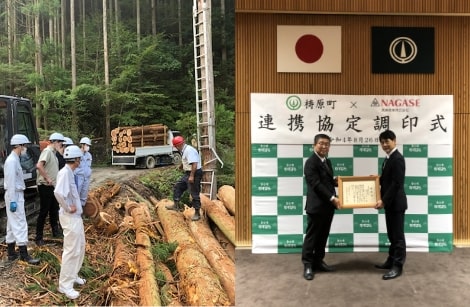
Initiatives for ecosystem conservation in the Hayashida River Basin
Nagase ChemteX Corporation
The NAGASE Group considers biodiversity conservation at its production sites to be an important issue. The Harima Plant of Nagase ChemteX Corporation is located in the Hayashida River basin, a tributary of the Ibo River in Hyogo Prefecture. In order to conserve biodiversity, the plant works with the Ibogawa River Fisheries Cooperative Association to carry out conservation activities (through the payment of cooperative fees, etc.) in the basin, where sweetfish, amur goby, and aucha perch (an endangered species) grow.
Cooperation with NGOs / Biodiversity initiatives
Nagase ChemteX Corporation
The NAGASE Group considers forest conservation as an important issue. Since 2010, Nagase ChemteX Corporation has been sending used stamps to the Tanzania Pole Pole Club, an NPO, to support their tree-planting activities on Mount Kilimanjaro (Tanzania, East Africa), a World Heritage Site, as well as self-reliance in activities and improvement of livelihoods.
Promotion of environmentally friendly sustainable plastics
The NAGASE Group considers the promotion of environmentally friendly sustainable plastics as an important issue. NAGASE & CO., LTD. handles TENITE™ cellulose, a biomaterial made from wood, as a Japanese agent of Eastman Chemical Company. TENITE™ cellulose is manufactured from conifers that have been systematically harvested from forests certified by the Forest Stewardship Council (FSC®).
It is a resin material made by replacing some of the hydroxyl groups of cellulose with acetic anhydride, propionic acid or butyric acid, and adding an additive (plasticizer) to make it moldable. The percentage of bio-materials is about 40% to 50%. NAGASE will continue to contribute to the conservation of biodiversity by promoting TENITE™ cellulose, an environmentally friendly sustainable plastic.
TENITE™ manufacturing process
